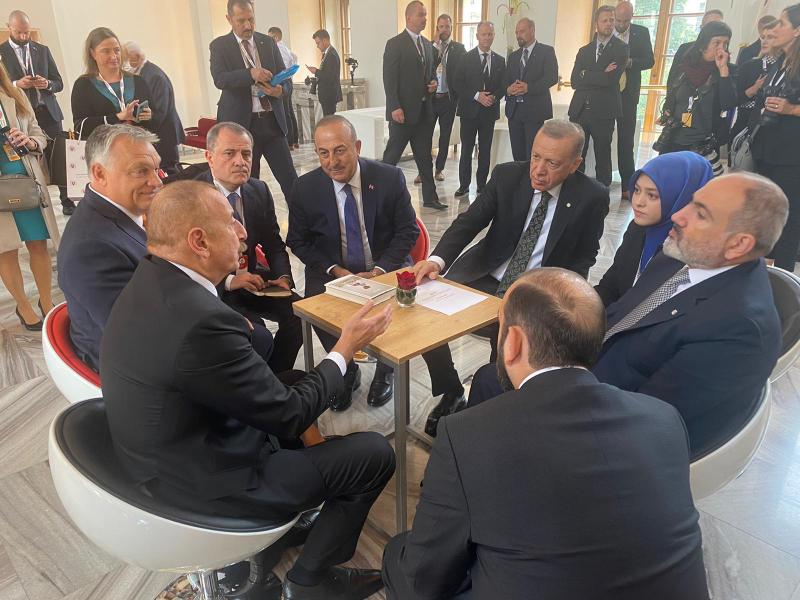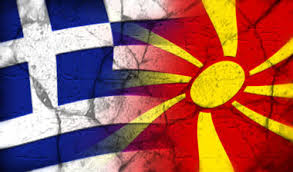
Amidst the slow pace of the Azerbaijan-Armenia peace treaty process and the measured steps being taken in the Türkiye-Armenia normalization process, we continue to observe attempts to harm Türkiye-Azerbaijan relations in a way that would benefit Armenia in the South Caucasus region.[1] The formula for these attempts remains unchanged from the previous months; portraying “big brother” Türkiye’s foreign policy as being hijacked by the “little brother” Azerbaijan, which -it is argued- creates a situation that undermines Türkiye’s power and prestige both in the South Caucasus and in global affairs. A recent lengthy article[2] authored by Anna Ohanyan and published by the Carnegie Endowment for International Peace -a prestigious American think tank- contains all the essential arguments used with the goal of prompting Türkiye to hastily normalize relations with Armenia at the expense of Türkiye’s relations with Azerbaijan.
By boiling down Ohanyan’s arguments to their basic elements, we arrive at the demands being made upon Türkiye by Armenia’s traditional backers in the Western world; Türkiye must abandon its “assertive and militarist” approach in foreign policy and its staunch “nationalist” support of Azerbaijan and de-link its normalization process with Armenia from Armenia’s peace treaty process with Azerbaijan. This, it is argued, is the only way for Türkiye to uphold international norms, behave as a peace broker in the South Caucasus, bolster regional trade and transportation, and fulfill its potential as a responsible middle power.
The article highlights the peculiar Western tradition of misinterpreting Türkiye’s complex historical position in Eurasia and its foreign policy objectives. It also highlights the Western-centric assumption that Western countries’ foreign policies represent the norm and are geared towards building peace, while any other countries’ policies that contradict Western agenda are revisionist and bound to lead to destabilization. This is a profoundly unjust and unconstructive way of approaching international affairs.
The international norms that were established after the Second World War and propagated after the end of the Cold War have been under sustained attack by none other than the major powers of the international system. Without getting bogged down in the details, it will suffice to state that the United States, the European Union, China, Russia, and India, for example, have all engaged in both minor and major acts that violate international norms, yet they have either been never reprimanded for it, or they have not been reprimanded in a way that would dissuade them from repeating the same violations. The global developments in the last few years have clearly demonstrated that the international system lacks the mechanisms to properly keep major powers in check. In this fundamentally flawed international system, an assertive foreign policy -backed by military power but tempered by constructive approach- is a necessity, especially for countries like Türkiye being squeezed on all sides by geopolitical pressures. Without an assertive foreign policy, Türkiye -for example- would not have been able to push back against Greece’s maximalist claims in the Aegean Sea or against the EU’s policies in the Mediterranean Sea and the Balkans that are designed to sideline or exclude Türkiye.
While the idea of being a peace broker in the South Caucasus sounds nice, it is simply not possible for Türkiye to act as a peace broker in the relationship between Azerbaijan and Armenia. Considering its troubled historical relationship with Türkiye dating back to the Ottoman times and the fact that it is a Turkish state, it would be absurd for Armenia to even expect Türkiye to act as a mediating party in its dealings with Azerbaijan, which is another Turkish state. It is for this reason that Armenia, historically viewing Azerbaijan and Türkiye as its “Turkish foes”, has traditionally relied on the support of the US, France, and Russia to counterbalance Azerbaijan and Türkiye. In this respect, the US, France, and Russia have all behaved as partisan actors in the context of the Armenia-Azerbaijan-Türkiye triangle (“partisan actor” is a term Ohanyan uses for Türkiye due to its support for Azerbaijan). It is no wonder then that the Organization for Security and Co-operation in Europe (OSCE) Minsk Group established for the resolution of the Karabakh Conflict yielded no results for three decades, because the group’s three co-chairs were none other than the US, France, and Russia. The OSCE Minsk Group was used to preserve the status quo in the Karabakh Conflict in favor of Armenia, which eventually forced Azerbaijan to take matters into its own hands, as the alternative to this was a perpetual occupation of Karabakh by Armenia. Considering this, Ohanyan’s accusation that Türkiye’s support for Azerbaijan while it regained Karabakh using military means “further weakened the already fragile multilateral framework of the [OSCE Minsk Group], which was rooted in liberal principles of rights, representation, and inclusivity,” rings very hallow.
Referring to Türkiye’s staunch support for Azerbaijan and its outreach to the Turkic states in Central Asia as being “nationalistic” is a simplistic explanation that ignores why Azerbaijan and Central Asia are valuable for Türkiye. These countries offer a framework of economic and political cooperation based on a shared cultural heritage and outlook on life and serve as a corridor for Türkiye to connect Europe with Asia-Pacific, two of the largest markets in the world. This cooperation bears similarities to the special relationship between the United State and the United Kingdom based on a shared Anglo-Saxon heritage and the formation of the EU based on the idea of “Europeanness” (a nebulous concept often used to exclude Türkiye). As such, Türkiye’s relationship with Azerbaijan or the other Turkic states in Central Asia cannot be reduced to empty nationalism; Türkiye receives tangible benefits from this relationship, and the said relationship helps Türkiye to position itself in a world undergoing a laborious transition to a multi-polar system.
Lastly, the Carnegie Endowment article completely overlooks the main reason for Türkiye’s insistence that Armenia must first sign a peace treaty with Azerbaijan before normalization can take place with Türkiye:
“Türkiye is Armenia’s direct land access to the European Union. Having grown increasingly wary of Russia’s choking influence over it, Armenia is carefully attempting to move away from Russia and towards the EU (and by association, the United States). Normalization with Türkiye is therefore Armenia’s top priority. Were Armenia to first normalize its relations with Türkiye, it would have no need to establish peace in a way that will address Azerbaijan’s grievances. Türkiye is therefore using its position to force Armenia to come to an agreement with Azerbaijan and ease the realization of Azerbaijan’s foreign policy objectives.”[3]
Decoupling Türkiye’s relationship with Armenia from Armenia’s relationship with Azerbaijan would land a blow to Türkiye’s relationship with Azerbaijan, which would result in economic and political damage for Türkiye. It would be absurd for Türkiye to sacrifice its relationship with Azerbaijan for the sake of Armenia, a country that -despite being a neighbor of symbolic significance- simply does not carry the same significance as Azerbaijan based on multiple factors. It is a shame that the Carnegie Endowment article neglects to properly utilize the many interviews Ohanyan conducted with various experts in Türkiye to come to a more nuanced understanding of Turkish sensitivities and objectives regarding the South Caucasus region.
*Picture: Turkish President Recep Tayyip Erdoğan, Azerbaijani President İlham Aliyev, and Armenian Prime Minister Nikol Pashinyan sitting together and holding a discussion during a meeting of the European Political Community (EPC) on 6 October 2022 in Prague. – Source: Anadolu Agency
[3] Tulun, “Azerbaijan-Armenia Peace Treaty Process and Attempts to Undermine Türkiye-Azerbaijan Relations”.
© 2009-2025 Center for Eurasian Studies (AVİM) All Rights Reserved

 ARMENIA AND THE VENERATION OF TERRORISTS
ARMENIA AND THE VENERATION OF TERRORISTS
 AZERBAIJAN-ARMENIA PEACE TREATY PROCESS AND ATTEMPTS TO UNDERMINE TÜRKİYE-AZERBAIJAN RELATIONS - II
AZERBAIJAN-ARMENIA PEACE TREATY PROCESS AND ATTEMPTS TO UNDERMINE TÜRKİYE-AZERBAIJAN RELATIONS - II
 POPE FRANCIS’ DOUBLE STANDARD – II
POPE FRANCIS’ DOUBLE STANDARD – II
 PERSISTING IN THE MISTAKES OF THE PAST
PERSISTING IN THE MISTAKES OF THE PAST
 TÜRKİYE’S SOUTH CAUCASUS POLICY AND THE WEST’S CONFLICTING APPROACH
TÜRKİYE’S SOUTH CAUCASUS POLICY AND THE WEST’S CONFLICTING APPROACH
 AMBASSADOR WARLICK’S SIX POINTS REGARDING PEACE FOR NAGORNO-KARABAKH
AMBASSADOR WARLICK’S SIX POINTS REGARDING PEACE FOR NAGORNO-KARABAKH
 VAHAN CARDASHIAN AND THE CRUSADE TO SABOTAGE TURKISH-AMERICAN RELATIONS
VAHAN CARDASHIAN AND THE CRUSADE TO SABOTAGE TURKISH-AMERICAN RELATIONS
 THE AZERBAIJAN-ARMENIA PEACE PROCESS AND THE IMPACTS OF LOBBIES
THE AZERBAIJAN-ARMENIA PEACE PROCESS AND THE IMPACTS OF LOBBIES
 M.M. GUNTER’S ANALYSIS OF “THE THIRTY-YEAR GENOCIDE” BOOK BY B. MORRIS AND D. ZE’EVI
M.M. GUNTER’S ANALYSIS OF “THE THIRTY-YEAR GENOCIDE” BOOK BY B. MORRIS AND D. ZE’EVI
 CAN "NORTHERN MACEDONIA" SOLVE THE PROBLEM?
CAN "NORTHERN MACEDONIA" SOLVE THE PROBLEM?




























